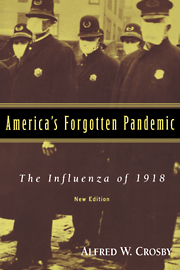Book contents
- Frontmatter
- Contents
- List of Graphs and Tables
- Preface to the New Edition
- PART I An Abrupt Introduction to Spanish Influenza
- PART II Spanish Influenza: The First Wave—Spring and Summer, 1918
- PART III The Second and Third Waves
- 4 The United States Begins to Take Note
- 5 Spanish Influenza Sweeps the Country
- 6 Flu in Philadelphia
- 7 Flu in San Francisco
- 8 Flu at Sea on the Voyage to France
- 9 Flu and the American Expeditionary Force
- 10 Flu and the Paris Peace Conference
- PART IV Measurements, Research, Conclusions, and Confusions
- PART V Afterword
- Index
10 - Flu and the Paris Peace Conference
Published online by Cambridge University Press: 05 June 2012
- Frontmatter
- Contents
- List of Graphs and Tables
- Preface to the New Edition
- PART I An Abrupt Introduction to Spanish Influenza
- PART II Spanish Influenza: The First Wave—Spring and Summer, 1918
- PART III The Second and Third Waves
- 4 The United States Begins to Take Note
- 5 Spanish Influenza Sweeps the Country
- 6 Flu in Philadelphia
- 7 Flu in San Francisco
- 8 Flu at Sea on the Voyage to France
- 9 Flu and the American Expeditionary Force
- 10 Flu and the Paris Peace Conference
- PART IV Measurements, Research, Conclusions, and Confusions
- PART V Afterword
- Index
Summary
World War I killed upwards of fifteen millions, wreaked immeasurable physical, social, and psychic damage, and left most of the citizens of the belligerent powers with a deep conviction that war must in some way be prohibited. After he got home, Lieutenant Frank Holden, like many other veterans, brooded on the possibility that the war to end all wars might in fact prove to be a fuse leading to future wars. This idealist, who had given up his space in ambulances to wounded comrades, answered with cynicism the claim that 1919's newborn were safe because the world was entering an era of peace: “Probably that is what mothers and fathers thought 20 and 30 years ago when so many of our war-crippled and blind were babies.” But he still had hope: perhaps “some kind of world court, call it what you will,” would be the way to avoid another war.
Such vague aspirations for a universal rule of law were the most powerful fresh political force in the world at the end of the war, and they lifted Woodrow Wilson, the celebrant of world government, to unprecedented fame. His Fourteen Points, guaranteeing a peace of reconciliation, his League of Nations, guaranteeing that war would never come again, and his very name were the stuff of the dreams and prayers of the weary, frightened, and chastened everywhere in the final months of 1918. “Your vision of the new world that should spring from the ashes of the old,” wrote one of his admirers in December, “is all that had made the war tolerable to many of us.”
- Type
- Chapter
- Information
- America's Forgotten PandemicThe Influenza of 1918, pp. 171 - 200Publisher: Cambridge University PressPrint publication year: 2003



